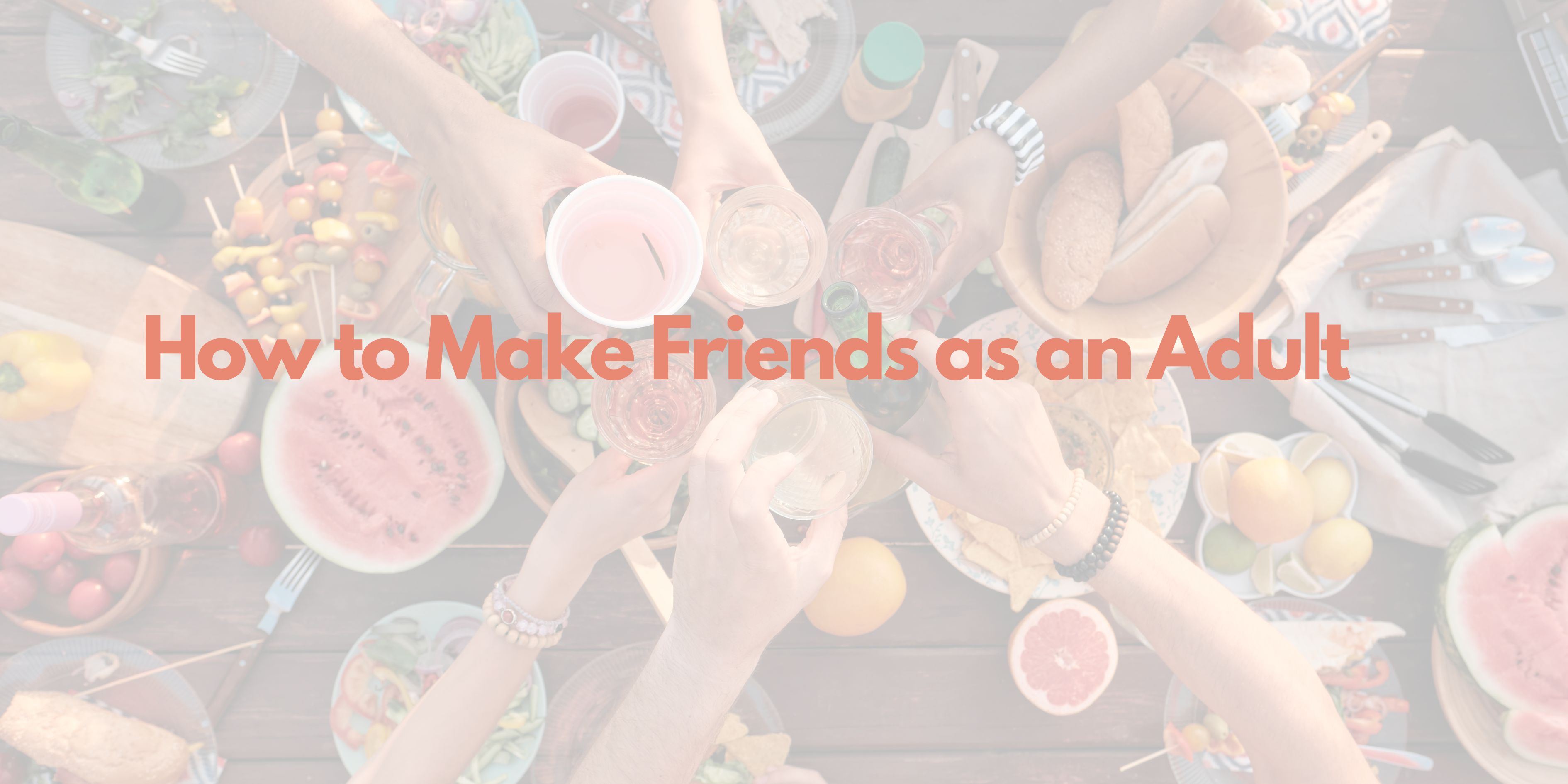How to make Friends as an Adult

Making friends as a kid was easy.
You just had to be near someone roughly your own height with a mutual love for dinosaurs, fairy bread, or pretending the floor was lava.
Making friends as an adult?
That’s a whole different ballgame — one with invisible rules, time pressures, and a lot more fear of rejection.
But here’s the thing: you’re not too old, too weird, or too late.
You might just need a different game plan.
Let’s talk about how to make friends as an adult — and, just as importantly, how to keep them once you do.
Why It Feels So Hard
If making friends as an adult feels harder than doing your taxes while blindfolded — you're not imagining it.
Research from the University of Kansas found that it takes about 50 hours of shared time to turn an acquaintance into a casual friend, and 200 hours to become close friends.¹
As adults, with jobs, families, and a mountain of responsibilities, those hours don’t fall into our laps the way they did in school or uni.
Friendship now requires something that used to be automatic: intentional effort.
And while that can feel intimidating, it’s also incredibly empowering.
Because real, lasting friendships don’t happen by accident — they’re built.
Step 1: Start Where You Already Are
You don’t have to start from scratch.
Often, potential friends are already circling in your world — like planets just waiting to collide.
-
That neighbour you always chat with at the letterbox.
-
The mum you see every week at soccer training.
-
The coworker you laugh with but have never seen outside of a break room.
Pick one person you already like a little bit and take a tiny risk — send a text, suggest a coffee, or linger five more minutes for a chat.
Friendship often starts not with a grand gesture, but with a "Hey, do you want to grab a coffee sometime?"
Step 2: Say Yes (Even When It’s Easier to Say No)
- After a long day, saying no to a social invitation can feel like self-care.
Sometimes it is. But sometimes it’s fear dressed up as fatigue. - Psychologists call this "approach-avoidance conflict" — we want connection but fear rejection.²
When Sarah was invited to a trivia night by a new acquaintance, she nearly cancelled three times. She was tired, anxious, and convinced no one would talk to her. But she went anyway — and met two women who would later become her closest friends.
If you’re on the fence about a social invitation and you have the energy to spare, lean into yes.
Your future friends might be waiting on the other side of that awkward first step.
Step 3: Create Micro-Moments of Connection
Big friendships are built from small bricks.
Research shows that consistent small interactions — like a quick chat after yoga, a meme sent via text, or an offer to help carry groceries — are what strengthen relationships over time.³
Focus on micro-moments:
-
Reply to their story on Instagram.
-
Text them after a catch-up saying, “Loved seeing you today!”
-
Invite them for a walk instead of waiting for a "perfect" event.
Friendship grows in the margins of life, not just at big events.
Step 4: Be Brave Enough to Go First
Everyone wants deeper friendships — but many people are waiting for someone else to make the first move.
Be that someone.
Vulnerability researcher Brené Brown calls this "being the first to dare".⁴
Sharing a little more of yourself first — whether it’s admitting you’re nervous or talking about something real — often gives others permission to meet you there.
It’s like a game of emotional Marco Polo — someone has to call out first so the others know it’s safe to answer.
Step 5: Understand That Some Friendships Are Seasonal
Not every connection will turn into a lifelong friendship.
And that's not failure — it's nature.
Some friendships are like campfires: bright, beautiful, but temporary.
Others are like oak trees: slow-growing, sturdy, enduring.
If someone drifts away, let them with love.
Save your energy for watering the friendships that truly nourish you.
Step 6: Invest, Even When It's Not Convenient
Friendship isn’t built on convenience — it’s built on commitment.
-
Reply to the text, even if it’s three days later.
-
Show up when your friend is moving house or needs a listening ear.
-
Celebrate their wins, even if your own week was rough.
Good friendships are less about grand declarations and more about quiet consistencies.
Why Bother?
Because real friendship isn’t just a “nice-to-have.”
It’s a literal life extender.
A study published in PLOS Medicine found that strong social relationships increase your chance of survival by 50% — similar to quitting smoking or maintaining a healthy weight.⁵
Friendship doesn’t just make life sweeter.
It makes life longer.
Making friends as an adult isn’t easy — but it’s absolutely possible.
It starts small.
It grows slowly.
It’s made of ordinary moments laced with extraordinary meaning.
And you don’t have to do it perfectly.
You just have to keep showing up.
The village you’re craving?
It’s waiting for you to build it — one conversation, one coffee, one brave “hello” at a time.
References:
¹ Hall, J. A. (2019). How many hours does it take to make a friend? Journal of Social and Personal Relationships.
² Lewin, K. (1935). A Dynamic Theory of Personality.
³ Sandstrom, G. M., & Dunn, E. W. (2014). Social interactions and well-being. Personality and Social Psychology Bulletin.
⁴ Brown, B. (2010). The Gifts of Imperfection.
⁵ Holt-Lunstad, J. et al. (2010). Social relationships and mortality risk: A meta-analytic review. PLOS Medicine.
